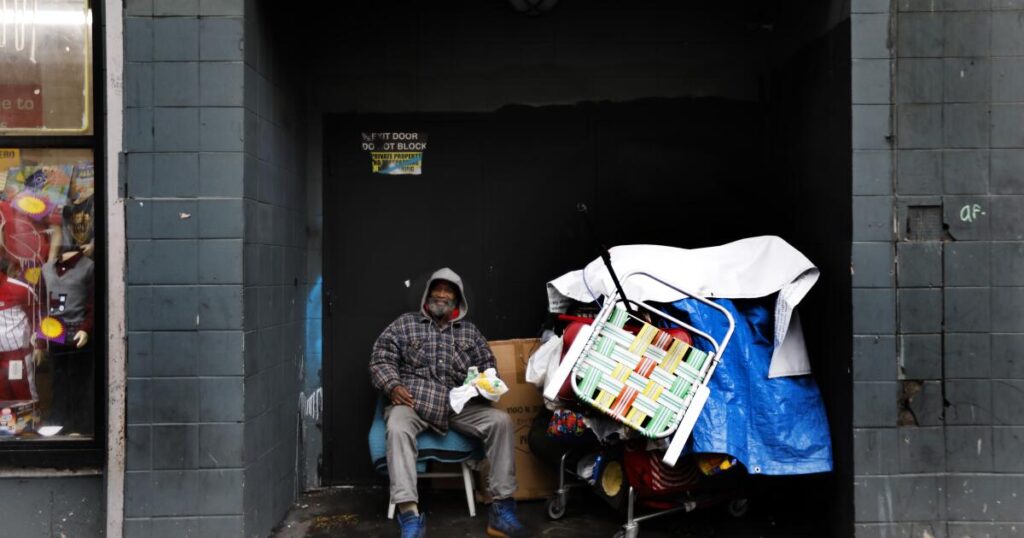Nations is the managing director of UC San Diego's Homeless Hub, a research institute in the School of Urban Studies and Planning, and lives in Oceanside.
On April 9, the California State Auditor released an important report on homeless services plans for the cities of San Diego and San Jose. The report makes clear that San Diego's homeless services need more consistent and robust evaluation, given how much money is being funneled into efforts to reduce homelessness.
As Managing Director of the Homeless Hub at the University of California, San Diego, I know firsthand the value of a robust evaluation of homeless programs in our region. But evaluating homelessness programs does more than save money.
Evaluations can inform how programs can best respond to the diverse needs of unhoused neighbors and inform local agencies where they can most effectively direct their resources. Imminent budget cuts at all levels of government mean local capacity to distinguish between effective and ineffective interventions is more important than ever. As one of the biggest and more enduring challenges facing our region, understanding what actually works to reduce homelessness must be a top priority.
We have already begun this effort here in San Diego. For example, from 2020 to 2023, members of the Homeless Hub team evaluated a city-funded safe parking program run by Jewish Family Services. Through this program, San Diegans living out of their cars are given a safe place to stay and connections to basic hygiene and care services. These are also connected to residential navigation resources.
Our research shows that expanding working hours and income support can significantly improve the quality of services provided to customers and help more people move into permanent housing. The City of San Diego implemented several of our recommendations to improve the program and expanded it from one location to four locations. California lawmakers use our research to advocate for federal funding for safe parking programs.
Another project evaluated tenant rights education workshops that are part of the city's eviction prevention program. The workshop provided tenants with a guidebook for resolving disputes between renters and property owners, with the aim of reducing avoidable evictions.
Our evaluation identified specific ways the program could be improved to reach more tenants and increase its ability to retain relevant information. We worked with our workshop provider to implement changes to the workshop format to expand our reach and demonstrate the program's effectiveness in providing vulnerable tenants with resources to help them maintain their housing.
Importantly, this work could not be done effectively without the insight and expertise of people with experience of homelessness. Homelessness Hub has begun recruiting people with lived experience as co-researchers. In doing so, we improved every aspect of our work, from the research questions we ask to the strength of our collaboration.
For example, the Homeless Hub is currently working closely with the Regional Task Force on Homelessness to assess services across the county. Having co-researchers with lived experience allows us to focus on the gaps and disconnections in services that make it difficult for people to escape homelessness, such as the disconnect between hospitalization and prison and emergency housing. Ta.
Despite the benefits of program evaluation, much research is done on an ad hoc basis or not at all. Once the evaluation is complete, it often begins long after the program has been established. As a result, there is usually no baseline data to understand whether the program is actually making a difference.
In San Diego, philanthropic organizations are investing to support evaluations, including funding efforts to hire co-researchers with experience of homelessness. The role of philanthropy here is very important. Donations are often disbursed immediately, allowing researchers to begin evaluation early in program development. Local authorities and housing authorities should work more closely with local universities and charities to develop such assessments before launching new programmes.
The state auditor's report primarily focuses on how the evaluation will help the city save money. Although this is an element of a robust program evaluation, it is only one program among many in the field of homeless programs.
Our homelessness crisis has been ongoing for more than 40 years. Homelessness is a complex and multifaceted issue that requires a complex and multifaceted response. Assessments carried out in collaboration between governments, universities, program providers and funders, and people with lived experience of homelessness can move us towards a future where homelessness is rare and short-lived. Essential for identifying programs and services. Only together can we ultimately create lasting change.



